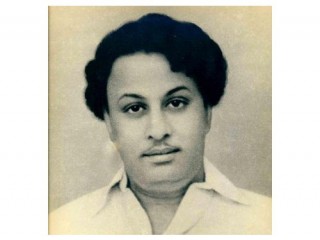
Maruthur Gopala Ramachandran biography
Date of birth : 1917-01-17
Date of death : 1987-12-24
Birthplace : Kandy, Srilanka
Nationality : Sri Lankan
Category : Famous Figures
Last modified : 2011-08-15
Credited as : Bollywood actor, Tamil films, politician
0 votes so far
In his youth, MGR and his elder brother, M. G. Chakrapani became members of a drama troupe to support their family. Influenced by Gandhian ideals, MGR joined the Indian National Congress. After a few years of acting in plays, he made his film debut in the 1936 film Sathi Leelavathi in a supporting role. In the late 1940s he graduated to leading roles and for the next three decades dominated the Tamil film industry. He became a member of the Dravida Munnetra Kazhagam (DMK) and rose rapidly through its ranks. He successfully used his popularity as a film hero to build a large political base. In 1972, he left the DMK to form his own party the Anna Dravida Munnetra Kazhagam (ADMK). In 1977 he became the chief minister of Tamil Nadu - the first film actor in India to become the chief minister of a state. He remained as chief minister till his death in 1987.
In Tamil Nadu, he has a reputation for philanthropism and is considered to be one of the greatest political leaders and actors of the state. He is idolized by his followers as Puratchi Thalaivar (lit. Revolutionary leader) MGR was posthumously honoured with the Bharat Ratna, India's highest civilian award.
He made his film debut in 1935, in the film Sati Leelavati, directed by Ellis Dungan, an American born film director. Generally starring in romance or action films, MGR got his big breakthrough in the 1947 film Rajakumaari, written by M. Karunanidhi. Soon he rose to superstardom in the 1954 blockbuster Malaikallan. He acted as hero in the Tamil film industry's first ever colour movie, the 1955 blockbuster Ali Baba and the forty thieves. He rose to become the heart throb of millions of Indians with movies such as Anbe Vaa, Aayirathil Oruvan, Mahadevi, Panam Padaithavan, Ulagam Sutrum Vaalibhan, 'Adimaippenn, etc. He won the National Film Award for Best Actor for the film Rickshakaran. His film Nadodi Mannan, which was a tamil version of the interpretation of the Prisoner of Zenda, was produced and directed by himself and released in 1956, ran to full houses. He began to act in many movies that appealed to the direct sentiments of the common man and the rich as well. His 1973 blockbuster Ulagam Sutrum Vaalibhan broke previous box office records. It was one of the few movies filmed abroad in those days. It was shot in Singapore, Malaysia, Thailand, Hong Kong and Japan. The DMK unsuccessfully tried to curtail that movie. His acting career ended in 1978 with his last movie, Madurai Meettu Sundara Pandian, which he acted when he was the Chief Minister of the state.He was awarded the Bharat Ratna, India's highest civilian award, in 1988 (posthumous).
Awards:
Filmfare Best Actor Award for Enga Veettu Pillai
Filmfare Best Film Award for Adimai Penn
National Film Award for Best Actor for the film Rickshakaran in 1972.
Honorary doctorate received from University of Madras and The World University (Arizona).
Bharat Ratna was conferred by the Government of India (posthumously) in 1988 for his reformation activities and support from Tamil Nadu.
He personally offered relief in disasters and calamities like fire, flood, drought, and cyclones. He was the first donor during the war with China in 1962, donating Rs. 75,000 to the war fund. He was the founder and editor of Thai weekly magazine and Anna daily newspaper in Tamil. He was the owner of Sathya Studios and Emgeeyar Pictures (willed to charity) which produced many of the films he acted in. He gifted a golden sword weighing half a Kilogram to Mookambika temple in Kollur, Udupi district
As producer & director
1958 : Nadodi Mannan
1973 : Ulagam Sutrum Valiban
1977 : Madhurai Meetha Sundharapandian
















